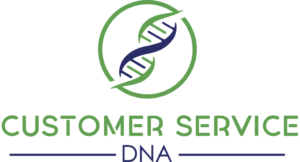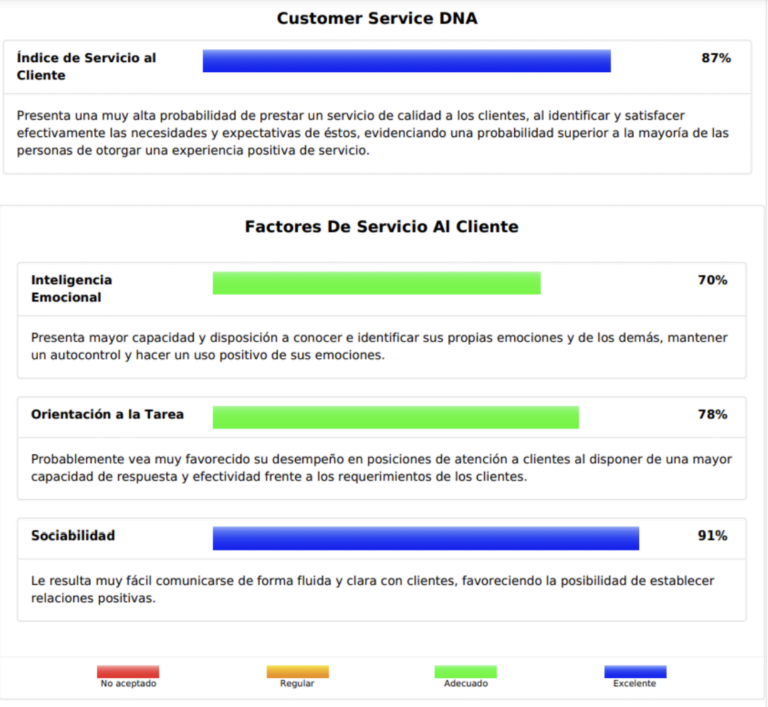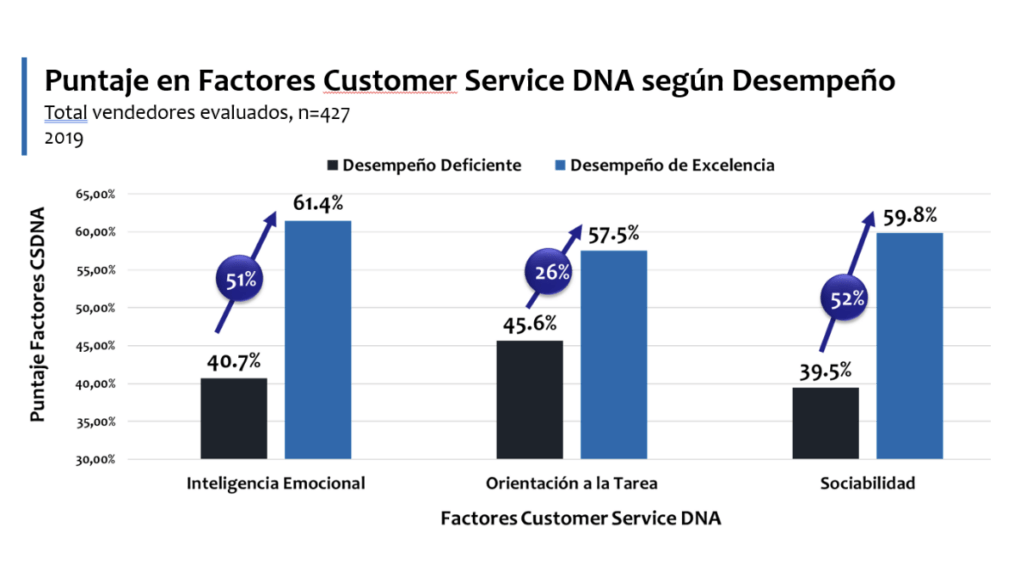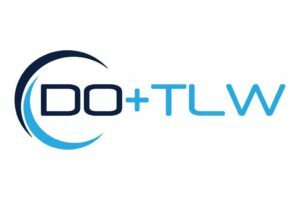Customer Service Test

What is Customer Service and how do we develop it?
Customer Service DNA® (CSDNA) measures an individual's likelihood of successfully performing in customer service roles.
This model allows us to identify people who enjoy interacting with others, focused on solving their requirements and establishing positive relationships with them.
CSDNA® is Based on 3 Key Factors
- Task orientation
- Sociability
- Emotional Intelligence
Each predictive factor of the Customer Service Model is based on extensive research developed with the purpose of improving the selection and evaluation standards of collaborators.
Measure the DNA of Service in your Collaborators and Candidates.
Those evaluated with the CSDNA® test with high scores are characterized by:
- Be assertive in your communication with clients.
- Effectively resolve client requirements.
- Be flexible and look for solutions to provide good service.
- Communicate appropriately and enjoy interacting with others.
- Use your emotions positively and based on your work.
- Be able to monitor your own emotions and identify those of the client.
- Manage your own emotions, staying calm in more stressful situations.
INFORMATION
Name: CSDNA©, CUSTOMER SERVICE DNA©
Use: for candidates and collaborators in all types of companies.
Number of Questions: 60 items.
Application Time: 10 minutes.
Terms of validity: Variety of criteria.
Reliability: Cronbach's alpha of 0.84
Languages: Latin American Spanish, Portuguese and English.
Oriented a: Call center, administrative staff, receptionists, nurses, customer service, monitors, among others.
Why use customer service selection tests?
The digital era has implied enormous challenges for companies since the customer has evolved significantly. Mainly from a more passive and dependent client, the current client is very informed, independent, very demanding and very empowered, demanding his rights in case of not receiving satisfactory customer service.
Additionally, the impact of technology and especially social networks, allows exponentially amplifying some unsatisfactory customer service experience, viralizing videos in minutes or transmitting situations in real time, which the customer believes are inappropriate. Which in some cases, can be very damaging to the image of the companies that provide products or services.
Multiple cases go viral every day, from restaurants, retail stores, call center calls, financial companies, among others, which present situations in which the company's customer service representative is threatened by the possible consequences of a viralization of their behavior (appropriate or inappropriate).
In this way, now more than ever, providing excellent customer service has become a strategic necessity for companies that interact with customers on a daily basis. In addition, it allows them to differentiate themselves in a highly competitive market.
In this context, identifying suitable people for customer service functions is essential for companies.
In this context, several leading companies in LATAM asked VYA Consulting Group to develop a tool that would account for this reality and allow them to support the management of customer service in companies, being able to identify the DNA of customer service.
The Customer Service DNA test aims to measure the DNA of customer service, identifying three key factors that a person who fulfills these functions must have developed: Emotional Intelligence, Task Orientation and Sociability.
Undoubtedly, implementing the Customer Service DNA customer service test allows you to improve customer service indicators in companies, increasing customer retention and loyalty.
Why is emotional intelligence so relevant in customer service?
Since the 90s, the model of emotional intelligence has appeared strongly based on the publications of Salovery & Mayer, which is gradually linked to the quality of customer service, generating extensive subsequent evidence.
Emotional intelligence is defined as the ability to monitor one's own and others' emotions, identify them, and use that information to guide thought and action. Various authors conceptualized emotional intelligence in four dimensions:
– Assessment of personal emotions. It involves knowing and expressing emotions naturally
– Assessment of other people's emotions. It is perceiving and reading other people's emotions and minds.
– Self-control and regulation of emotions. Adjustment and control of one's emotions.
– Positive use of emotions. Use your own emotions, directing them towards constructive activities and personal performance.
Various studies have related emotional intelligence to customer service, since employees with a high level of emotional intelligence tend to perform better in customer service positions because they can perceive and interpret their own and other people's emotions accurately, use their emotional knowledge to facilitate thoughts and behaviors and easily regulate their own emotions, according to a given situation.
Based on this evidence, it was reason to include an indicator of emotional intelligence applied to customer service, being part of the Customer Service DNA customer service test as a predictor of excellent customer service.
Does customer service vary according to each position?
Obviously, there are various functions within companies with different levels of customer service. Among the variables to define the typologies associated with customer service positions, we can highlight:
– Type of Contact: Physical or virtual (phone, chat, email)
– Duration of the interaction: Time in which the client is interacted with until the requirement is resolved.
– Service versus transactional experience: The interaction is based on strict protocols, as is the case of a fast food restaurant cashier or a salesperson who must identify the customer's need.
– Frequency of interaction: Average number of times in which the client is interacted with until the requirement is resolved.
– Complexity of the interaction. We differentiate from the delivery of simple information such as schedules or other similar information, to the delivery of technical information about a product or service.
The Customer Service DNA customer service test covers the essence or DNA of customer service, in order to cover the different associated positions, distinguishing 3 main axes as determinants of good performance in customer service functions: Emotional Intelligence, Sociability and Task Orientation.
How to understand excellence in customer service?
Performance in customer service has generally been conceptualized as types of behaviors that an employee performs with the purpose of satisfying the customer.
Customer service quality has been defined including five dimensions:
- Tangibles: Ability to perform service accurately and reliably.
- Responsiveness, which considers the desire to help clients provide timely services.
- Knowledge and courtesy of the employee and his ability to inspire confidence.
- Empathy, the care and attention that an employee provides to the customer, generating a service experience.
- Task fulfillment, which are formal procedures and standards that regulate customer service roles.
What is the Customer Service DNA customer service test?
El Customer Service DNA or CSDNA customer service test corresponds to a 60-item questionnaire with Likert-type alternatives, applied online to candidates and employees, taking on average less than 10 minutes to complete.
It operates on our TEST-HR.COM processing platform, providing usage statistics to client companies, as well as the option to download the data in Excel format to perform your own statistical analysis.
The Customer Service DNA or CSDNA customer service test is an exclusive and comprehensive evaluation tool, developed by a team of multidisciplinary experts made up of experts in the commercial and psychometric areas, in order to generate a model that is useful for companies. users, seeking to improve service and customer service indicators in companies, by being able to identify people with excellent customer service.
The Customer Service DNA customer service test is currently available in three languages: Spanish, Portuguese and English and is used mainly in Mexico, Colombia, Chile, Peru and Brazil with excellent results in terms of its validity and reliability, effectively identifying candidates and employees with excellent performance in tasks associated with customer service.
The Customer Service DNA personnel selection test is used for any level of position, highlighting positions with greater interaction with customers, in particular cashiers, salespeople, promoters, customer service representatives, support, call center, nurses, among other positions.
This psychometric test is highly accurate, is answered online and measures the following three factors in candidates and collaborators:
- Emotional Intelligence,
- Task Orientation and
- Sociability
It provides a global indicator, presenting the probability of excellent performance in customer service functions.
What factors does the Customer Service DNA customer service test measure?
The Customer Service DNA customer service test considers 3 main axes as determinants of good performance in customer service functions: Emotional Intelligence, Sociability and Task Orientation.
EMOTIONAL INTELLIGENCE
Since the 90s, the concept of emotional intelligence has received great attention from researchers, as well as in organizational literature.
Emotional intelligence is defined as the ability to monitor one's own and others' emotions, identify them, and use that information to guide thought and action. Some authors conceptualized emotional intelligence in four dimensions:
– Assessment of personal emotions. It involves knowing and expressing emotions naturally
– Assessment of other people's emotions. It is perceiving and reading other people's emotions and minds.
– Self-control and regulation of emotions. Adjustment and control of one's emotions.
– Positive use of emotions. Use your own emotions, directing them towards constructive activities and personal performance.
Various studies in the area of administration have found the benefits of emotional intelligence in the workplace; for example, some authors claim that emotional intelligence is a better predictor of job performance than the traditional intelligence quotient or IQ.
Various studies have related emotional intelligence to customer service, since employees with a high level of emotional intelligence tend to perform better in customer service positions because they can perceive and interpret their own and other people's emotions accurately, use your emotional knowledge to facilitate thoughts and behaviors and easily regulate your own emotions according to a given situation.
Aeeun Jeon (2016) was able to establish the importance of emotional intelligence for commercial flight attendant roles in South Korea, finding that the best qualified understand their emotions and use them appropriately, present their real emotions and modify their negative feelings for more positive emotions. Desirable skills required for effective customer service in flight attendant positions.
Based on this evidence and other research carried out internationally, it was the reason to include an indicator of emotional intelligence applied to customer service, being part of the Customer Service DNA model.
The Customer Service DNA model defines emotional intelligence in 4 key axes:
- Identify your own emotions.
- Identify emotions of others.
- Control of emotions.
- Positive use of emotions.
SOCIABILITY
People who enjoy interacting with others are, of course, better prepared to perform customer service functions, considering that they daily involve various interactions with multiple people every day and throughout the work day, and there must be levels of sociability that favor this interaction. .
Providing quality service necessarily involves having the necessary social skills, which has been widely studied in various research.
The Sociability factor measures the probability of communicating effectively, clearly and fluently. Willingness, interest and energy to interact with people and to satisfy the needs of clients and users, establishing contacts based on the affection and well-being of others.
TASK ORIENTATION
An essential part of the Service has to do with providing the solution to a specific requirement, therefore, the technical component, which is evaluated in this aspect mainly related to care, attention to details and orientation to the task.
Task Orientation refers to the employee's need to solve the client's need correctly, considering a tendency towards precision and being organized.
Measures the probability of having adequate responsiveness and effectiveness in response to customer requirements.
Based on the measurement of the three aforementioned factors, the General Customer Service Indicator is evaluated, which measures the ability to provide excellent customer service, defined as:
- Respond to the client's request,
- Relate appropriately to generate a positive and pleasant experience, and in the same way,
- Have the ability to monitor the client's emotions and oneself, to quickly adapt and manage situations.
Why use the Customer Service DNA customer service test?
The importance of establishing controls in selection processes through valid and reliable customer service tests has been demonstrated as an effective mechanism in improving customer service indicators. In this way, the use of the Customer Service DNA personnel selection test becomes an effective measure in improving customer service indicators.
It is worth mentioning that the work of customer service is not entirely easy, having to interact many times with aggressive, uninvolved or frustrated customers during long hours, in which fatigue and boredom can affect performance. For this reason, the use of customer service measurement instruments allows us to identify people with a better disposition to face these types of challenges.
Based on the Customer Service DNA model, we have that people with better customer service skills will be more flexible and assertive, they will also have a higher level of self-control, being able to handle complex situations, that is, with high levels of emotional intelligence. On the other hand, sociability allows you to enjoy interacting with clients throughout the day and every day, as they are people who like to meet different people and be able to interact with them. Finally, there is always a reason to generate customer service, a specific requirement or a solution that is sought, in this way providing a timely response is also a key task in the work of customer service, being efficient in responding to the customer. , measured through the task orientation scale of the Customer Service DNA model.
Due to its solidity and theoretical and methodological foundation, the Customer Service DNA customer service test becomes an excellent solution that is easy to implement when implemented through the TEST-HR.COM processing platform that allows immediate reports and a dashboard of the usage statistics, among other aspects.
What information does it provide about the evaluated candidates and collaborators?
The Customer Service DNA customer service test is applied online after 10 minutes on average, generating an easy-to-interpret report for your company.
The report provided depends on whether it is applied to candidates or current employees, since the comparison scales differ in both cases, as well as the detail of each report.
The report provides an overall customer service indicator indicator and provides scores on three factors:
- Emotional Intelligence,
- Task Orientation and
- Sociability
The scores are expressed in percentiles, facilitating the interpretation of the report. Where 1 represents the lowest score and 99 the highest, the ideal being obtaining scores close to 99 points.
The CSDNA customer service test report is very complete, as it includes the Global Customer Service Indicator, scores on the three factors, interpretation of the results obtained, and follow-up questions for a follow-up interview.

Can I apply the CSDNA customer service test to current employees or collaborators?
The Customer Service DNA customer service test is used in evaluation processes with current employees with excellent results.
The use of the CSDNA test in employees allows a quick diagnosis of the development needs of its collaborators, planning programs to enhance emotional intelligence, social skills or efficiency in the specific tasks carried out.
How was it created?
Customer Service DNA was developed by the company VYA CONSULTING GROUP at the request of various clients who found it necessary to implement a brief, quick and predictive customer service test that would provide easily interpreted information in service representative selection processes. to the client.
First of all, we carried out an extensive bibliographic review of the factors associated with customer service and attention in companies.
We developed a preliminary instrument of 71 items that was applied to 798 people who fulfilled customer service functions, answering the online questionnaire. Of the total number of those evaluated, we were able to analyze a total of 600 cases with complete information on their performance, being classified by management as high and low level of performance in customer service.
We developed various analyzes in order to optimize the model, finally being able to generate a 60-item questionnaire, measuring the three key factors associated with customer service.
The application was carried out on people from companies in Mexico and Colombia in order to have greater heterogeneity and representativeness, in addition to considering various nationalities.
Various subsequent validation studies were carried out in various companies and institutions in order to provide greater evidence of the validity and reliability of the Customer Service DNA customer service test.
Does it effectively predict employees' level of customer service? How has it been validated?
Multiple studies have been carried out in various companies in several countries, which can significantly impact customer service indicators by improving their personnel selection processes.
The following graph summarizes the validation of the CSDNA customer service test in an important Mexican company.
The CSDNA test was applied to 427 salespeople from a retail company, having classified them according to their performance in terms of customer service, differentiating them between excellent performance and poor performance.
As can be seen, the blue column responds to the average score obtained in each of the three factors essential to the DNA of customer service, being in the three analyzes significantly higher for those defined with excellence in customer service.
This evidence allows us to contribute to the predictive validity of the Customer Service DNA customer service test as a predictor of excellent performance in customer service functions.

Customer benefits
As a client of our solutions, your company will receive access to the chosen tests and the online processing platform, as well as support from our experts for the best use of these solutions.
You will have training in the use of our tools and support for basic material and documentation of the developed models.
We are at your disposal to support you through comprehensive and professional advice.
TRAINING
From day one and throughout the service cycle, in-person or online training is available to all test administrators. Supported with exclusive audiovisual training material
SUPPORT FOR
Our team will always be available to answer user questions, usually with almost immediate response times, establishing a close long-term relationship.
RESEARCH
Scientific research and publications provide solid support for evaluation decisions and enable accurate ROI calculations.
ADVISORY
We are an interdisciplinary team of experts and researchers with vast experience in the fields of psychology, psychometrics and personnel evaluation.









